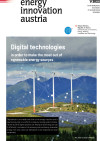Suchergebnisse
Strategies and Operator Tools for Grid Restoration with Massive Renewable Energy Sources (RestoreGrid4RES)
RestoreGrid4RES faces the future renewable based generation structure within the transformation to a renewable and ecological power supply. The project had been funded in the frame of the „Joint Programming Platform Smart Energy Systems“ (JPP SES).
Agriculture 2020
Agriculture will become an important supplier of sustainable energy services for society. However, this sector can only fulfil this role if it operates on the base of sustainable energy provision itself. The project will determine the necessary measures to achieve this state for a concrete regional setting (eastern Styria) by the year 2020.
Study of the Potential of Popcorn-Technologies for the Austrian Energy System
Virtual Green Power Plant
Preparation and initiation of the implementation of a Virtual Green Power Plant based on renewable energy sources at the Program Responsible Party of oekostrom AG - The conception of a power utility within the Austrian power market.
Smart Metering consumption
The project Smart Metering consumption focused on the energy consumption of the future smart metering infrastructure - an issue not widely discussed until now.
Integration by Cooperation
The aim of the project was to assess which forms and conditions of interaction can foster the integration of higher shares of distributed generation into the Austrian electricity grid.
Sustainable quarter "Aspern"
The development concept for the new quarter in Vienna (a former airfield) demands a great deal of sustainability: overall energy strategy, sustainability criteria as financial incentives for applicants for building permits and construction of sustainable and energy efficient buildings.
Energy system - Industrial region
Analysis of success factors, restrictions and risks on the development and implementation process caused by the system integration of renewable energy technology in industrial regions with higher energy demand.
IEA Bioenergy Task "GHG Balances"
Participation in the investigation net of the IEA Bioenergy to greenhouse gas balance of biomass and bioenergetics systems as well as coordination of the Austrian participation in IEA Bioenergy.
Heat in containers
Storage of industrial waste heat in latent heat storage systems (common transport containers). Use of the heat in commercial enterprises and public or private buildings with integration of conventional energy suppliers. Technical and financial feasibility study.
FT-Biofuels in Austria
Development of a realistic concept for the production of Fischer-Tropsch-fuels from biomass in a size of about 200.000 to/a in Austria. Comprehensive evaluation of this concept with respect to available biomass resources, and economical and ecological benefits.
Virtual power plants and DSM
For the cost efficient and lasting energy supply from ecological sources, wind, photovoltaic and biomass have to be integrated in existing grids. New methods for DSM and virtual power stations are investigated, to improve the control behaviour.
SmallWindPower@Home - Impact assessment of building-mounted small wind turbines on performance, people, building and environment
Within the project SmallWindPower@Home the impact of complex obstacles on the local flow pattern as well as on the inflow and the performance of different building-mounted small wind turbines (SWT) had been evaluated. Furthermore the effects of these building-mounted SWT on the building, the resident people and the direct environment were analysed.
Biomass-Logistic-Centers
By establishing regionally best situated logistic centers it shall be guaranteed that in all of Styria transport and processing costs will be reduced and that a continual supply of biomass firewood of constant quality is ensured.
Site certificate
Possibilities and requirements of transferring the Swiss “2000-Watt Site” certificate to Austria
Energy park Micheldorf-Hirt
Co-operative merging of the energy supply for the Region of Micheldorf within an operating scheme and supply of energy produced through renewable resources. Sustainable, autarkic, economic energy park. Energy supply by renewable resources for the building of the energy autarkic region Micheldorf-Hirt
Virtual Biogas - Biogas-Upgrading and Grid-Injection
Production of natural gas substitute from biogas and grid-injection to the public natural gas grid on an industrial scale using the two-staged membrane separation process gaspermeation. Design and erection of the upgrading plant at the biogas plant Bruck/Leitha as well as monitoring and optimisation of the operational characteristics.
Saving energy with "single-family house contracting"
Saving energy with "single-family house contracting": developing of standardized modules for energy saving measures, evaluation methods for proving the quality of the measures, model contracts and marketing-strategies.
Digital technologies

Digital technologies in order to make the most out of renewable energy sources.
energy innovation austria
1/2022
Herausgeber: BMK in cooperation with the Climate and Energy Fund
Englisch, 12 Seiten
Downloads zur Publikation
Biogas as Vehicle Fuel - Economic Feasibility in Austria
The main objectives of this project are to discuss the economic feasibility of the production and distribution of biogas used as transportation fuel and to identify those types of local distribution systems that are already economically feasible under the present economic conditions in Austria.
